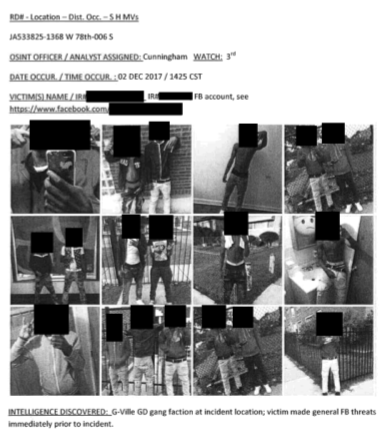
An OSINT log including social media posts, obtained by the ACLU via FOIA.

Manual and automated monitoring of speech on social media such as Twitter and Instagram.
It is unclear where exactly CPD has applied social media monitoring. However, CPD claims to use social media monitoring to disrupt gang and gun violence, so the practice likely disproportionately targets communities of color.
CPD has also worked with Chicago Public Schools to implement social media monitoring in at least 24 schools, most of which are in Chicago’s South and West sides, supposedly to identify and intervene with students involved in gang and criminal activity.
Invoices obtained through FOIA indicate that CPD spent $1.25 million on Dunami, a social media analytics software funded by In-Q-Tel, the venture capital arm of the CIA.
CPD has also spent hundreds of thousands of dollars for other social media related products and services over the past few years.
Chicago Public Schools’ social media monitoring program was funded by a $2.2 million grant from the National Institute of Justice, which lasted from 2014 to 2018.
CPD Open Source Intelligence (OSINT) officers are responsible for compiling publicly accessible information (e.g. social media posts) related to investigations. Logs produced by OSINT officers on individual subjects often include links to social media accounts and even posts.
Geofeedia can associate social media posts with locations. After being called out by the ACLU, however, many social media platforms have restricted Geofeedia’s access to their users’ data.
Dunami has been used by FBI and CBP “to determine networks of association, centers of influence and potential signs of radicalization.” Dunami has been used by CPD and CPS to monitor for “signs of violence and gang membership” among students.
CPD’s social media policy claims that social media is a valuable tool for investigating crimes and gang activity, although the efficacy of social media monitoring is unclear.
The University of Chicago Crime Lab, which helped implement CPS’ social media monitoring program, claims that schools which used social media monitoring experienced greater drops in misconduct and suspensions than those that didn't, although they did not find a significant difference in incidents of gun violence between these two sets of schools.
However, researchers have raised concerns about the accuracy of social media monitoring algorithms, which are far from capable of understanding the complexities of human communication and how it varies contextually. For example, algorithms cannot understand jokes or slang, and thus are prone to flagging posts that don't need to cause concern.
A study by Stanford sociologist Forrest Stuart on social media use and gang conflict on the South Side of Chicago found that online activity that officers or administrators may find threatening, such as posts with gang symbols or guns, are more likely to be shows of strength aimed at preventing violence rather than indications that violence will occur.
Documents obtained by the ACLU of Illinois and LPL via FOIA reveal that CPD monitors the social media accounts of victims of gun violence, as well as their families and friends.
ACLU has called on the CPD to end social media monitoring, arguing that the CPD’s social media monitoring practices are opaque, and that CPD did not notify or receive consent from the City Council to purchase social media monitoring software.
Social media monitoring threatens first amendment protected activities. In its marketing materials, Geofeedia claims that it helped police monitor protests in Ferguson in 2015. Activists are concerned about geofencing, whereby law enforcement can monitor social media posts and other data in a given place, such as a protest or a mosque. Amidst protests in 2020 against racial inequality, CPD set up a 20 person team to monitor social media and respond to looting and unrest. CPD emphazises that it only analyzes publicly available social media posts, yet by using these posts to target and investigate individuals, they are breeching constitutional protections of free expression.
An investigation by ProPublica found that many students and even administrators were unaware that social media monitoring was occurring at their schools. The report also notes multiple incidents where students were uncomfortable in interventions by police and were pressured to admit gang affiliations. Students who are flagged for their social media activity are also at risk of being added to CPD's gang database.

An OSINT log including social media posts, obtained by the ACLU via FOIA.